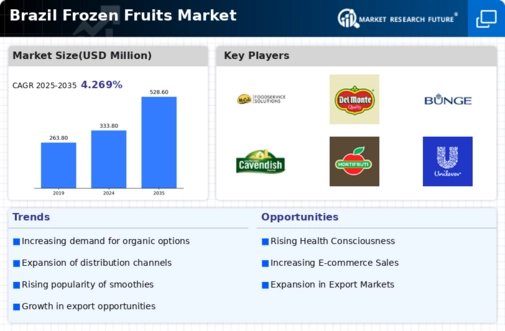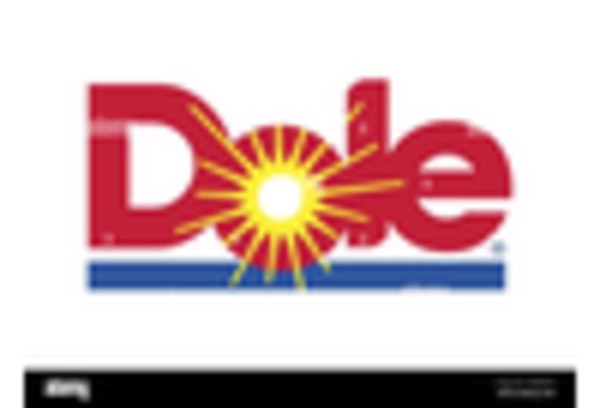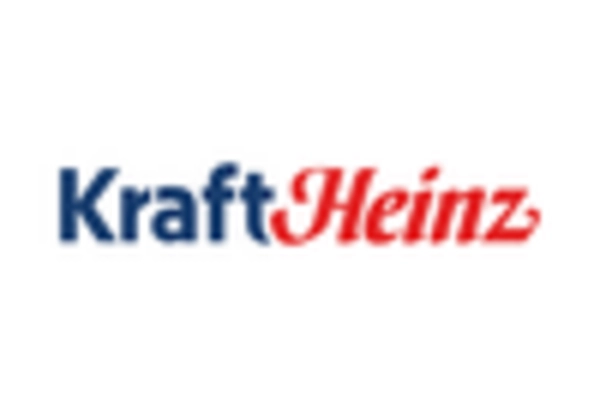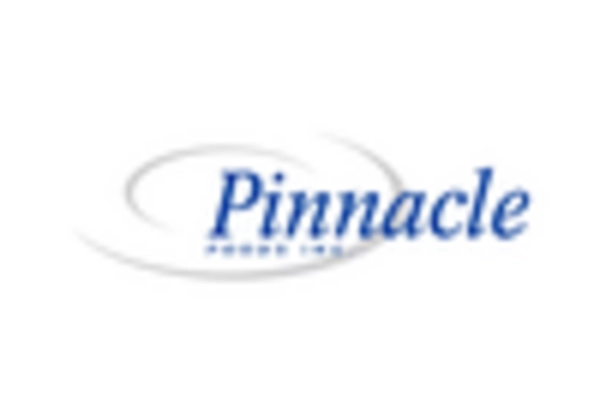Expansion of Retail Channels
The frozen fruits market in Brazil is experiencing significant growth due to the expansion of retail channels. Supermarkets, hypermarkets, and online grocery platforms are increasingly stocking a diverse range of frozen fruit products. This accessibility is crucial, as it allows consumers to easily purchase frozen fruits, thereby enhancing market penetration. Recent statistics show that online grocery sales in Brazil have surged by 25% over the past year, indicating a shift in shopping habits. The frozen fruits market is likely to benefit from this trend, as consumers are drawn to the convenience of purchasing frozen fruits online. Additionally, the presence of frozen fruits in various retail formats increases brand visibility and consumer choice, further stimulating market growth.
Innovative Product Offerings
Innovation within the frozen fruits market is a key driver of growth in Brazil. Companies are increasingly introducing new product lines, such as organic frozen fruits and blends tailored for specific dietary needs. This diversification caters to a broader audience, including health-conscious consumers and those with dietary restrictions. For instance, the introduction of frozen fruit mixes designed for smoothies has gained popularity, appealing to fitness enthusiasts. The frozen fruits market is thus evolving, with brands investing in research and development to create unique offerings. This trend not only enhances consumer interest but also positions companies competitively within the market, as they strive to meet the diverse preferences of Brazilian consumers.
Rising Demand for Healthy Snacks
The increasing inclination towards healthier eating habits among Brazilian consumers is driving the frozen fruits market. As more individuals seek nutritious snack alternatives, frozen fruits are perceived as a convenient option that retains essential vitamins and minerals. Recent data indicates that the market for frozen fruits in Brazil has expanded by approximately 15% in the last year, reflecting a growing consumer base that prioritizes health. This trend is particularly evident among younger demographics, who are more likely to incorporate frozen fruits into smoothies and desserts. The frozen fruits market is thus benefiting from this shift towards health-oriented consumption, as consumers are increasingly aware of the nutritional advantages of frozen fruits compared to processed snacks.
Increased Awareness of Food Waste
The growing awareness of food waste among Brazilian consumers is influencing the frozen fruits market positively. As individuals become more conscious of sustainability, they recognize that frozen fruits can help reduce waste by allowing for longer storage without spoilage. This awareness is prompting consumers to opt for frozen fruits over fresh options, which may perish quickly. The frozen fruits market is thus capitalizing on this trend, as brands emphasize the benefits of frozen fruits in minimizing food waste. Recent surveys indicate that approximately 60% of consumers in Brazil are actively seeking ways to reduce their food waste, further driving the demand for frozen fruits as a practical solution.
Rising Popularity of Plant-Based Diets
The increasing adoption of plant-based diets in Brazil is significantly impacting the frozen fruits market. As more consumers shift towards vegetarian and vegan lifestyles, the demand for plant-based ingredients, including frozen fruits, is on the rise. This trend is particularly pronounced among younger generations, who are more inclined to explore diverse dietary options. The frozen fruits market is likely to benefit from this shift, as frozen fruits serve as versatile ingredients in various plant-based recipes. Recent data suggests that the market for plant-based foods in Brazil has grown by 20% in the last year, indicating a robust interest in healthy, plant-based eating. This trend not only supports the growth of the frozen fruits market but also aligns with broader dietary shifts towards sustainability and health.
















